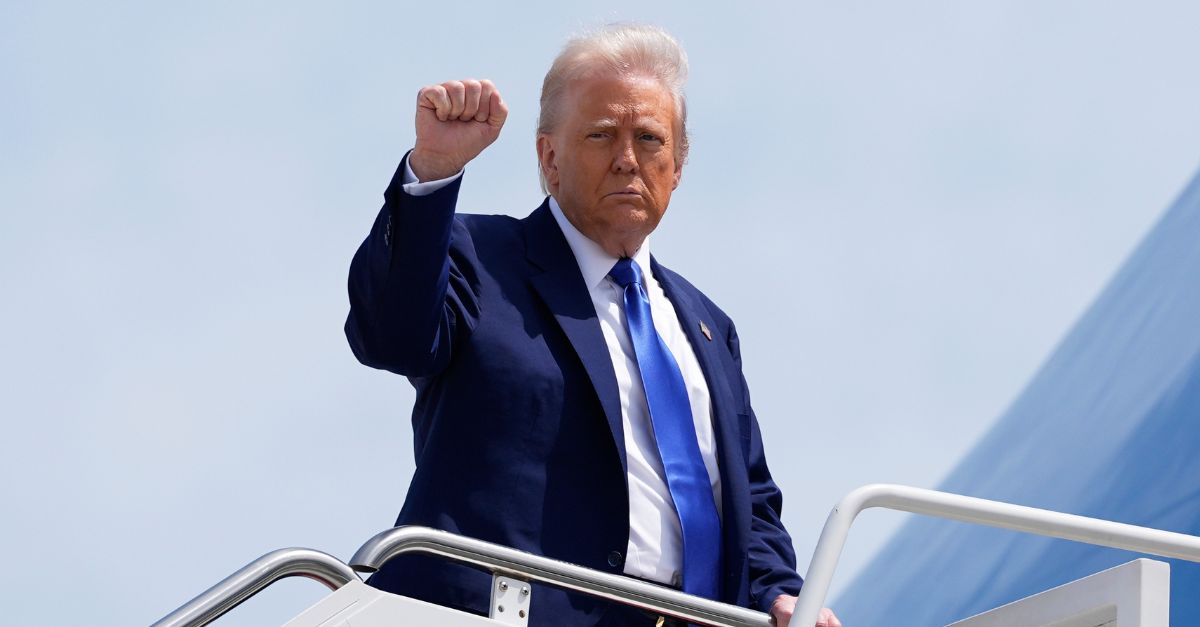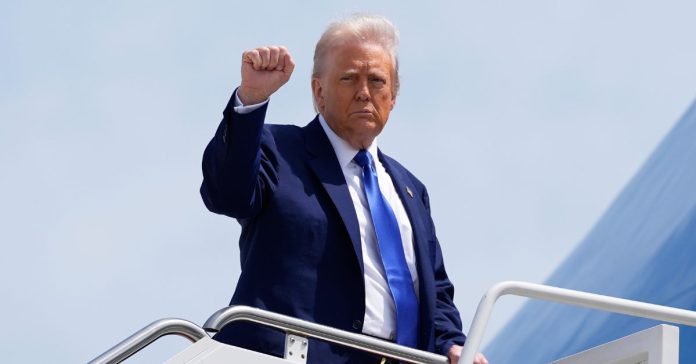
President Donald Trump boards Air Force One, Monday, May 12, 2025, at Joint Base Andrews, Maryland (AP Photo/Alex Brandon).
President Donald Trump won a key victory in his ongoing defamation lawsuit against the Pulitzer Prize Board as a Sunshine State court on Wednesday decided an immunity issue in his favor.
In January, the board moved to temporarily pause proceedings in the case until the 45th and 47th president’s current term in office is complete — after failing with a similar bid before the trial court.
In a seven-page opinion, Florida’s Fourth District Court of Appeal rejected those dilatory efforts out of hand.
“They argue a stay of the case will avoid the constitutional conflicts arising from allowing [Trump] to proceed as a plaintiff in a state court civil action on claims that may involve his official conduct as the President,” the court writes. “[W]e deny the petition and affirm the trial court’s order.”
The board argued that moving forward with the lawsuit “would now raise constitutional concerns for this court — or any other state court — to exercise ‘direct control’ over” Trump during his presidency. The motion to stay cited the supremacy and take care clauses of the U.S. Constitution in service of this argument.
“Petitioners effectively ask that the court invoke a temporary immunity under the Supremacy Clause on [Trump’s] behalf to stay this civil proceeding, even though [Trump] has not sought such relief,” the appellate court summarized. “They further allege that it would violate due process to allow [Trump] to claim constitutional entitlement to stay cases because of his office but not allow them the same ability.”
But the judges were not convinced.
On the specific question of constitutional privileges, the court notes the president has even more than the board cites in their motion.
“But such privileges are afforded to the President alone, not to his litigation adversaries,” the appellate court muses.
Taking stock of the broader concept, the court explains that other government officials — of lesser stature than the president — also enjoy “similar protections” and immunities from court proceedings.
Again, the court explains, only the privileged party is the one who can invoke the privilege in question.
“While government officials may claim the immunities and protections provided to them in court proceedings, the law is clear that such privileges are not available to third parties to claim, nor may such privileges be asserted by others on the officials’ behalf,” the opinion goes on. “The principle of standing says that, generally, one cannot assert someone else’s constitutional rights. Immunities and privileges, by their very nature, inure solely to the benefit of the individual for whom they are intended. Thus, application of a governmental immunity cannot be asserted by the Petitioners as private citizens.”
The Pulitzer Prize Board, in its appeal, justified its argument by noting how Trump himself has, on several occasions, cited constitutional protections for the president to try and pump the brakes on civil lawsuits in which he is the named defendant for non-presidential conduct. Specifically, the board cited a since-dropped lawsuit against Trump by Summer Zervos, a former contestant on The Apprentice.
The appeals court says this citation is “misplaced.”
“In Zervos, a New York court held that President Trump, as the sitting President of the United States, was not entitled to a stay in a state court action grounded in claims of defamation brought against him based on alleged actions that occurred before taking office,” the judges write.
In a separate but closely-related argument, the board also argued Trump is essentially precluded from objecting to the stay request because of similar arguments he has made — which is distinct from saying the court itself should rely on prior such arguments.
But, again, the court rejects this logic.
“These cases are not substantially similar to the one at bar to estop [Trump] from objecting to a stay,” the opinion continues. “By trying to draw parallels to those cases, Petitioners conflate situations where the President is a defendant in an action, in contrast to this case, where the President is the plaintiff. Because those cases involve situations where a President was the defendant on claims brought against him, and not a plaintiff pursuing claims initiated by him, those cases are inapposite.”
The court does accept the premise that litigation could cause “distractions” to an elected official as they carry out their public duties — but says this is clearly a “risk” the president has accepted.
“[T]his is not a case where the state court is asserting jurisdiction over [Trump] without his consent,” the court writes. “Quite the contrary. Here, [Trump] is a willing participant in the underlying proceedings and has thus far declined to assert a privilege to cease this action. Even though litigants may be entitled to claim a privilege, they may also voluntarily elect not to.”
The opinion goes on like this, at length:
When the President is a willing participant, courts do not risk improperly interfering with the essential functioning of government. The President — by virtue of his exceptional position — is uniquely equipped to determine how to use his time, to assess the attention a lawsuit will require, and to decide whether the lawsuit will divert him from his official business. When an officeholder chooses to initiate litigation, courts must assume the officeholder already has weighed the burdens on their official duties.
…
Courts should focus only on real burdens raised by the Executive as a plaintiff, not those hypothesized by any defendants. Whether the pursuit of this litigation is in his best interests, or consistent with the responsibilities of his office, is exclusively within Respondent’s purview. Therefore, the petition for review is denied.
Trump sued the board for defamation in December 2022, after several months of legal demands and threats to file such a lawsuit. The nexus of the lawsuit is the 2018 award for National Reporting which was co-granted to The Washington Post and The New York Times for their reporting on the “Russiagate” scandal. During the 2016 U.S. presidential election, some Russian nationals interfered on Trump’s behalf — sparking a yearslong search for evidence that Trump’s campaign was engaged in a conspiracy with the Russian government.
While special counsel Robert Mueller’s inquiries ultimately found no evidence of collusion with the Russian Federation, the two media companies were awarded for what the Pulitzer Prize board referred to as “deeply sourced, relentlessly reported coverage in the public interest that dramatically furthered the nation’s understanding of Russian interference in the 2016 presidential election and its connections to the Trump campaign, the President-elect’s transition team and his eventual administration.”
Unfortunately for the board, that was not all they said about the matter — ultimately responding publicly to Trump’s threats of litigation.
In 2022, the board defended its award with a lengthy statement that stood by the outlets’ reporting. In July 2024, a judge in Okeechobee County, Florida, ruled that the board’s statement was “actionable mixed opinion” and that Trump’s claims were “properly pled.”

